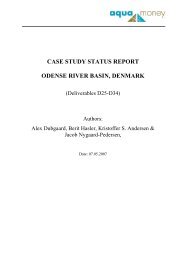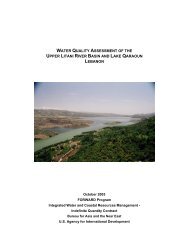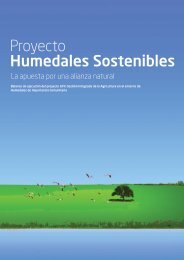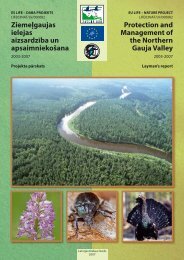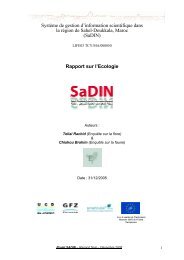RESTORATION OF WETLANDS At - wise-rtd.info
RESTORATION OF WETLANDS At - wise-rtd.info
RESTORATION OF WETLANDS At - wise-rtd.info
Create successful ePaper yourself
Turn your PDF publications into a flip-book with our unique Google optimized e-Paper software.
It is not only nature that benefits from project implementation,<br />
but it is the people of the whole Záhorie<br />
region as well. The wetlands are not just swamps full<br />
of mosquitoes, as many people think, but they can also<br />
bring many profits. Thus the restoration of wetlands is<br />
beneficial not only to preserve these unique habitats<br />
with their rare species, but also for agriculture, forestry,<br />
hunting and fishery. One of the most important functions<br />
of wetlands is the retention of water coming from<br />
rain and snow. This water is naturally released slowly<br />
from wetlands by out-flow and evaporation. In this way<br />
the undisturbed, well functioning wetlands contribute<br />
to the reduction of extreme climate like droughts, floods<br />
or storms. The restoration of their water regime<br />
increases retention capacity of wetlands (i.e. their ability<br />
to retain water), thus reducing the risk of floods in<br />
the whole watershed concerned. Restored wetlands<br />
represent important water supplies during dry seasons<br />
and efficiently prevent the start and spread of forest<br />
fires. This is especially important in the conditions of<br />
dry pine forests of Záhorie, in which such fires are still<br />
fairly common. On hot days, wetland water evaporates<br />
intensively and cools the surroundings, thus improving<br />
the local climate. The increase of air humidity and horizontal<br />
precipitation can be observed even up to several<br />
hundred metres from the edge of the wetland. This<br />
phenomenon positively affects the overall vitality and<br />
health status of the near-by forest stands that would<br />
other<strong>wise</strong> frequently suffer from drought. The spending<br />
made on wetlands restoration thus represents one of<br />
the best investments in the future of the landscape.<br />
The wetlands also provide an important spawning<br />
habitat for some fish species. Thanks to their low<br />
accessibility and sufficient water supply they are also<br />
frequently used by game species as a refuge and<br />
resting place, especially in hot weather. Wetland<br />
restoration also increases the recreational potential of<br />
the area. Most of the locals who are keen mushrooms<br />
pickers are well aware of the fact that during the dry<br />
season it only makes sense to search for mushrooms<br />
close to the wetlands as they cannot grow elsewhere<br />
due to lack of humidity. Thanks to the milder climate<br />
in the wetlands’ surroundings, these have become<br />
a mush room-pickers’ paradise.<br />
<strong>At</strong> the beginning of our efforts to start with wetland<br />
restoration we often had to overcome some distrust,<br />
scepticism and suspicion, especially from the side of<br />
local foresters and hunters. However, project achievements<br />
have convinced most of them that the water<br />
belongs to the forest, and that it was a right decision.<br />
Nowadays, in some hunting districts the hunters themselves<br />
are approaching us, conservationists, to cooperate<br />
further on wetlands restoration to increase their<br />
attraction for game. Thus the LIFE project “Restoration<br />
of the Wetlands of Záhorie Lowland“ has proved that<br />
the conservationists, foresters and hunters can have<br />
common interests that can be implemented together.<br />
Furthermore, the lessons learned from the project can<br />
be applied elsewhere in Slovakia, as well as in the<br />
other European countries, particularly for the benefit<br />
of wetlands as they represent an important part of our<br />
common European natural heritage.<br />
SCI Jasenácke<br />
Black Stork<br />
(Ciconia nigra)<br />
King Bolete<br />
(Boletus edulis)



